
ICAS Bulletin (online ISSN 2836-3418, print ISSN 2836-340X) is published every other week throughout the year at 1919 M St NW, Suite 310, Washington, DC 20036.
The online version of ICAS Bulletin can be found at chinaus-icas.org/bulletins/.
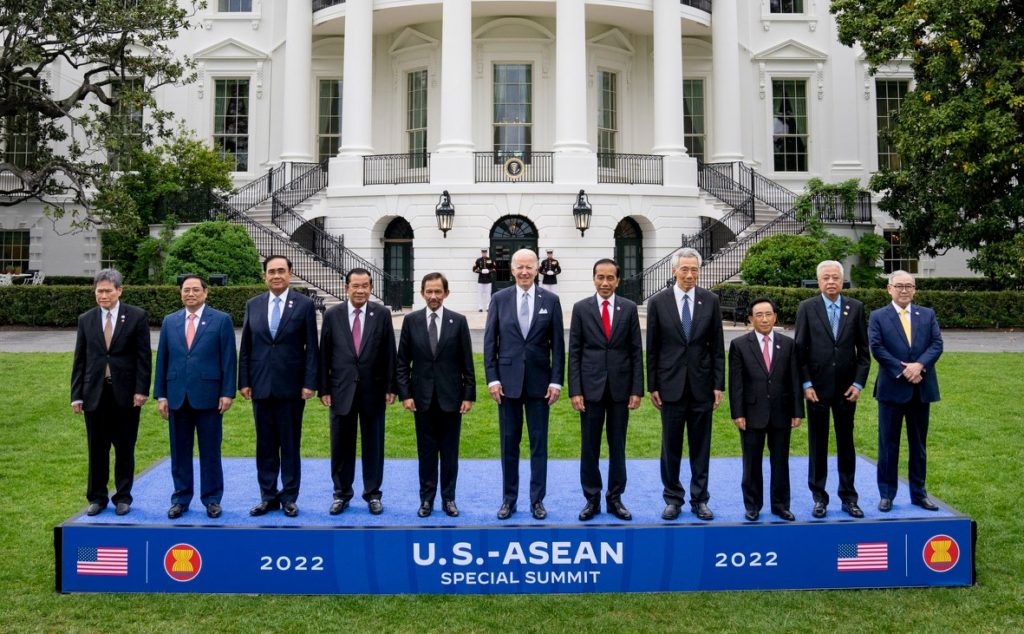
– On May 14, President Biden nominated Yohannes Abraham, chief of staff to the White House National Security Council, as ambassador to the 10-member Association of Southeast Asian Nations (ASEAN)
– From May 12-13, Biden hosted a U.S.-ASEAN Special Summit in Washington, hailed as an effort by the U.S. to reiterate its commitment to the regional bloc and assemble a united front against China.
– On the first day of the U.S.-ASEAN summit, Biden unveiled a $150 million aid package to ASEAN countries focusing on infrastructure, security, pandemic recovery, and promoting a ‘free and open Indo-Pacific.’
– The summit concluded with a 28-point joint ‘vision statement’ between the assembled leaders which hailed a “new era” of U.S.-ASEAN ties.
– Chinese Ministry of Foreign Affairs spokesperson Zhao Lijian welcomed the engagement as constructive and conducive to increased cooperation in the Indo-Pacific, but he urged the U.S. not to treat the region as a “zero-sum game” between China and the United States.
Associated News Sources:
“Biden names envoy to SE Asia bloc, stressing US attention”, AP News, May 14
“U.S. hails ‘new era’ with ASEAN as summit commits to raise level of ties”, Reuters, May 14 [Paywall]
“China warns US not to provoke confrontation as it pushes to boost ties with Southeast Asia”, South China Morning Post, May 13 [Paywall]
“With China in focus, Biden makes $150 million commitment to ASEAN leaders”, Reuters, May 13 [Paywall]
“Biden Hosts Southeast Asian Leaders as He Tries to Return Focus to China”, The New York Times, May 12 [Paywall]
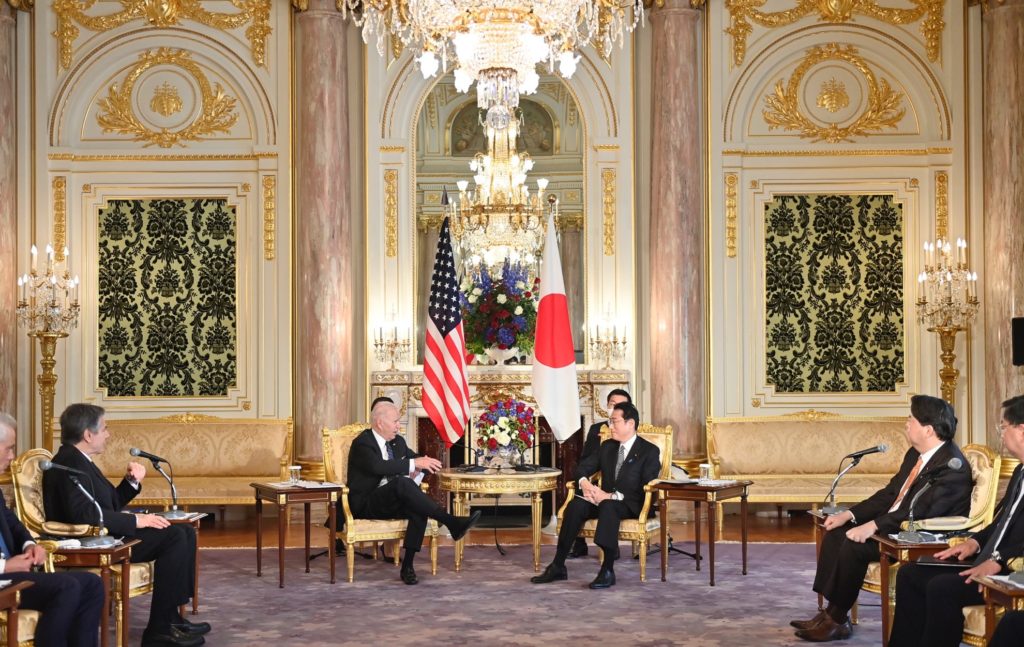
– On May 24, leaders of the United States, Japan, India and Australia launched a maritime initiative at the Quad Summit to combat illegal fishing and pledged to invest more than $50bn in developing infrastructure in the Indo-Pacific to counter China.
– On May 23, as a response to Biden’s Indo-Pacific Economic Framework, China’s Foreign Minister Wang Yi announced Beijing’s plan to advance China’s accession to the Comprehensive and Progressive Agreement for Trans-Pacific Partnership and the Digital Economy Partnership Agreement.
– On May 23, President Biden said that the U.S. would intervene militarily if China attempts to take Taiwan by force. The White House soon clarified that it doesn’t reflect a change in US policy.
– On May 17, U.S. Commerce Secretary Gina Raimondo confirmed Biden’s attempt to kick off the Indo-Pacific Economic Framework during his four-day visit to South Korea and Japan starting on May 20, a “cold war strategy” aiming to challenge China’s rising influence in the region.
Associated News Sources:
“At Tokyo summit, Quad offers ‘tangible benefits’ to counter China”, Al Jazeera, May 24
“China goes on offensive against IPEF, projects it as
‘economic NATO’ to blunt its dominance”, The Week, May 24
“Biden says US would respond ‘militarily’ if China attacked Taiwan, but White House insists there’s no policy change”, CNN, May 23
“Joe Biden’s IPEF economic pivot seen as ‘cold war strategy’, bringing China ‘sharp challenges’”, South China Morning Post, May 18 [Paywall]
“Biden’s Asia trip shifts focus to China”, The Hill, May 18

– On May 18, Chinese Premier Li Keqiang showed support for the country’s platform companies and digital economy enterprises to raise capital in domestic and overseas stock markets at a symposium with local government heads from 12 provinces.
– China is in talks with automakers about extending costly subsidies for electric vehicles to keep a key market growing as Shanghai lockdowns slow the broad economy.
– On May 11, China’s Ministry of Foreign Affairs spokesman Zhao Lijian urged to remove tariffs on Chinese products, as the Biden Administration considers controlling rising consumer prices in the U.S..
– While the U.S. Department of Commerce determines whether Chinese manufacturers are skirting U.S. duty rules on solar imports by funneling components through affiliates in nearby countries, hundreds of large-scale solar power projects are put on hold.
– In March, an internal Chinese Communist Party directive was launched to block promotions for senior cadres whose spouses or children hold significant assets abroad, aiming to insulate top officials from the types of sanctions directed at Russia now.
Associated News Sources:
“China Insists Party Elites Shed Overseas Assets, Eyeing Western Sanctions on Russia”, The Wall Street Journal, May 19 [Paywall]
“Chinese Premier Li Keqiang voices support for tech listings as China-US audit deal remains in limbo”, South China Morning Post, May 19 [Paywall]
“EXCLUSIVE China in talks with automakers on EV subsidy extension -sources”, Reuters, May 18 [Paywall]
“China implores US to drop tariffs that punish Americans and Chinese alike”, South China Morning Post, May 11 [Paywall]
“Solar projects are on hold as U.S. investigates whether China is skirting trade rules”, NPR, May 11
“Biden says White House could drop Trump China tariffs to lower consumer prices”, CNBC, May 10
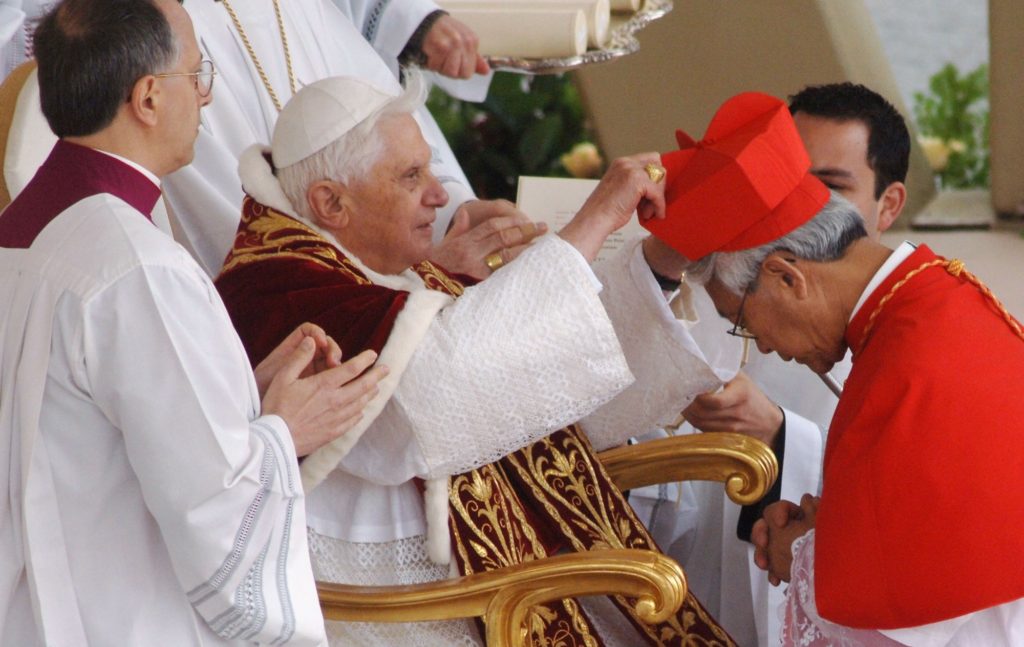
– On May 11, Hong Kong police arrested Cardinal Joseph Zen Ze-Kiun, formerly the Roman Catholic archbishop of Hong Kong, on the charge that he ‘colluded with foreign forces’ to endanger China’s national security.
– Four other trustees of the now-defunct 612 Humanitarian Relief Fund, which assisted pro-democracy protests throughout 2019, were also arrested per the provisions of a sweeping 2020 national security law.
– U.S. House Speaker Nancy Pelosi condemned the arrests to which Chinese MFA spokesperson Zhao Lijian responded by telling Pelosi to “mind her own business” and not “let Hong Kong bother her.”
– In the wake of the arrests, seven Republican congressmen penned a letter to President Biden urging him to impose sanctions on Hong Kong’s judges and prosecutors over their handling of national security cases.
– Hong Kong’s judiciary and Bar Association responded to the letter, calling the legislators’ call “absolutely unacceptable” and a “direct infringement” of the city’s rule of law.
Associated News Sources:
“Arrest of ‘Stubborn About Justice’ Cardinal Zen Divides Hong Kong’s Catholics”, The Wall Street Journal, May 16 [Paywall]
“Beijing urges Nancy Pelosi to ‘mind her own business’ in tit-for-tat row over Hong Kong cardinal’s arrest”, South China Morning Post, May 16 [Paywall]
“Call by US lawmakers for sanctions against Hong Kong judges and prosecutors handling national security law dismissed by judiciary as ‘absolutely unacceptable’”, South China Morning Post, May 11 [Paywall]
“Hong Kong Police Arrest Cardinal in National Security Case”, The New York Times, May 11 [Paywall]
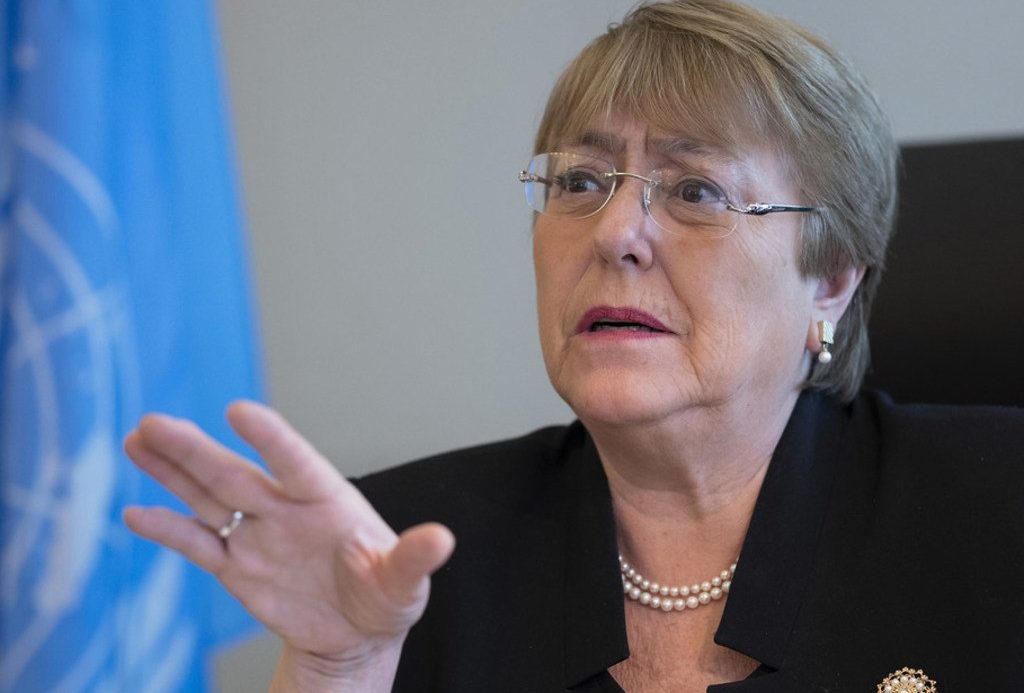
– UN Human Rights Chief Michelle Bachelet confirmed a six-to-seven-day visit to China, including Xinjiang, where the Chinese government has been accused of persecution of Uygurs and other ethnic Muslims.
– On May 17, a U.S. citizen and four China Ministry of State Security officials were charged with spying on pro-democracy activists and organizations.
– On May 17, the U.S. Justice Department sued the former CEO of Wynn Resorts Steve Wynn for acting as a Chinese agent and lobbying then-President Donald Trump at Beijing’s behest in 2017.
– On May 10, the U.S. Director of National Intelligence Avril Haines criticized the threat posed by China to Taiwan until 2030 to be “critical” and “acute”.
Associated News Sources:
“UN human rights chief’s China visit confirmed, including Xinjiang”, South China Morning Post, May 19 [Paywall]
“U.S. Citizen and Four Chinese Intelligence Officers Charged with Spying on Prominent Dissidents, Human Rights Leaders and Pro-Democracy Activists”, U.S. Department of Justice, May 18
“U.S. accuses casino tycoon Wynn of acting as Chinese agent”, Reuters, May 18 [Paywall]
“US official says China threat ‘critical’”, Taipei Times, May 12
“Beijing extends work-from-home order as COVID-19 cases rise”, ABC News, May 23, 2022
“Airbnb is closing its listings business in China”, CNN Business, May 24
“China pledges support for ailing economy, analysts doubt impact”, Al Jazeera, May 24
“S&P 500 Pares Losses After Hitting Bear-Market Territory”, The Wall Street Journal, May 20 [Paywall]
“Chinese Hackers Tried to Steal Russian Defense Data, Report Says”, The New York Times, May 19 [Paywall]
“China Competitiveness Bill Faces Hurdles as Time Runs Short”, The Wall Street Journal, May 16 [Paywall]
“China’s top diplomat hits out at Western critics who ‘distort the truth’ on pandemic controls”, South China Morning Post, May 16 [Paywall]
“China gives up 2023 Asian Cup hosting rights, Asian Football Confederation says”, Reuters, May 14 [Paywall]
“EXCLUSIVE Biden eyes new ways to bar China from scooping up U.S. data”, Reuters, May 12 [Paywall]
“Covid shutdowns in China are delaying medical scans in the U.S.”, The Washington Post, May 11 [Paywall]
“US Navy Amassess Its ‘Most Advanced’ Warships In Japan To Hunt Chinese Submarines, Defend Taiwan”, The EurAsian Times, May 10
“China warns US against attempts to dominate outer space”, South China Morning Post, May 11 [Paywall]
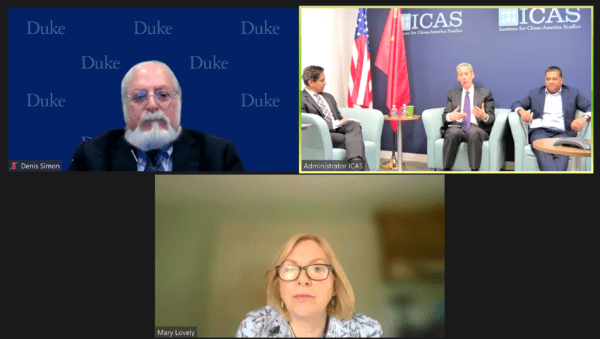
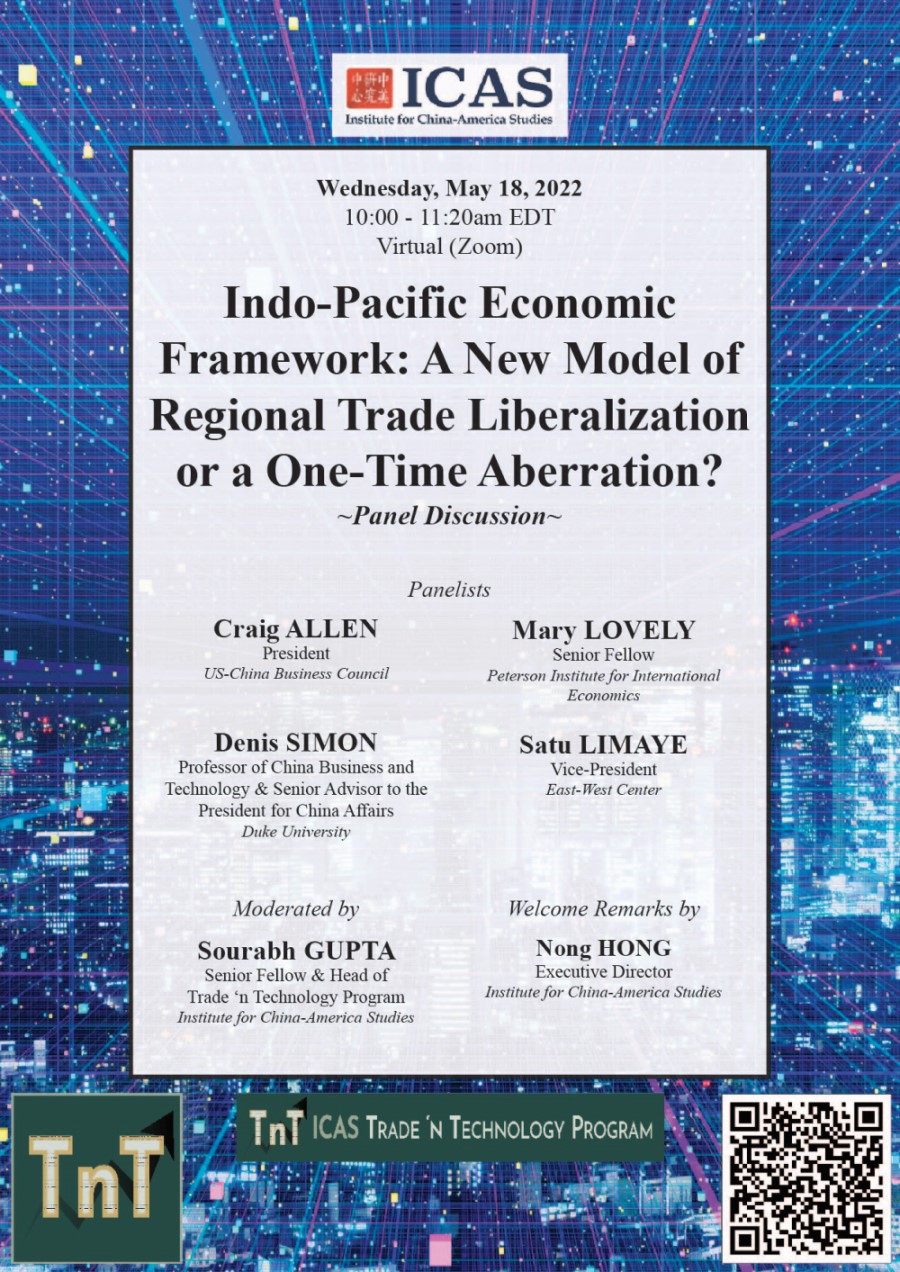
Indo-Pacific Economic Framework: A New Model of Regional Trade Liberalization or a One-Time Aberration?
ICAS Trade ‘n Technology Program Event
May 18, 2022
10:00am – 11:20am EST
On May 18, 2022, the Institute for China-America Studies (ICAS) hosted a virtual public event to discuss the to-be-imminently-launched Indo-Pacific Economic Framework (IPEF). The event was titled “Indo-Pacific Economic Framework: New Model of Regional Trade Liberalization or One-Time Aberration?” Dr. Hong Nong, Executive Director and Senior Fellow at ICAS, delivered the opening remarks, speaking about the scope for both competition and cooperation in U.S.-China and U.S.-Asia trade relations. The discussion was moderated by Mr. Sourabh Gupta, Senior Fellow, and Head of ICAS’ Trade n’ Technology Program, and featured four speakers: Mr. Craig Allen, President, U.S.-China Business Council, Dr. Mary Lovely, Senior Fellow, Peterson Institute for International Economics, Dr. Satu Limaye, Vice President, East-West Center, and Dr. Denis Simon, Professor of China Business and Technology & Senior Advisor to the President for China Affairs, Duke University.
On Thursday, May 19, a student delegation from Spelman College joined the ICAS staff as part of an educational program that Spelman College has in cooperation with George Washington University. Two George Washington University staff were present as well. The discussion, led by ICAS Senior Fellow Sourabh Gupta and involving other members of the ICAS staff, focused on careers in Washington, DC in international relations as well as the role that think tanks play in helping to shape policy and conversations on the U.S.-China relationship.
On May 24, ICAS hosted a delegation from the University of Maryland and students from Brunei, where the Biden administration’s trade and economic priorities in East and Southeast Asia were discussed. Additionally, the U.S. and Chinese approaches to climate change, industrial policies, and best practices for addressing transboundary environmental concerns in the Mekong region were raised at the table.
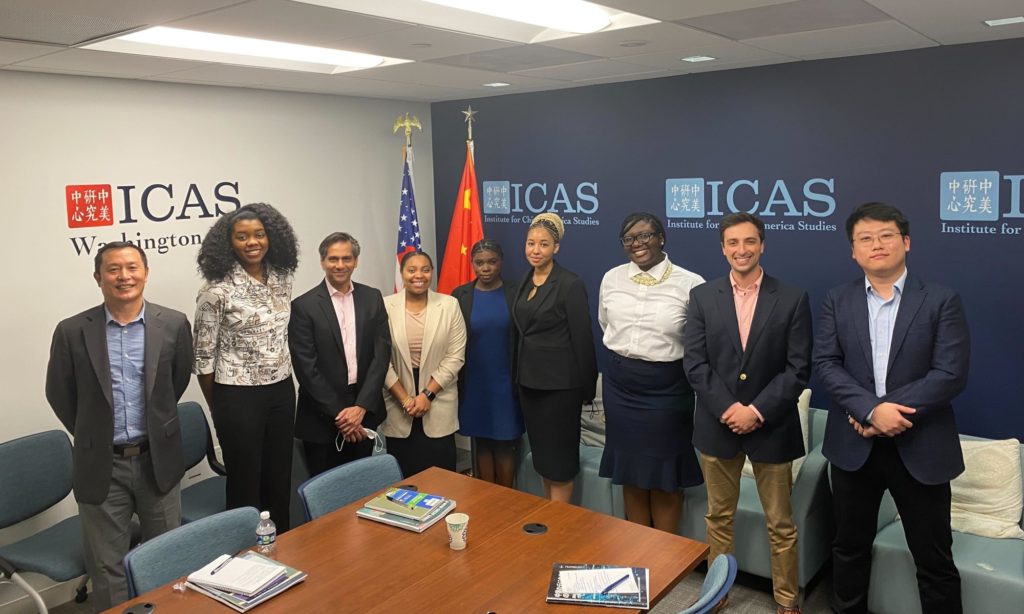
By Alec Caruana
May 19, 2022
As Australians head to the polls this weekend to elect their members of Parliament, national security will be a crucial issue in voters’ minds from across the political spectrum for the first time in decades. On the campaign trail, incumbent Prime Minister Scott Morrison and the Liberal-National Coalition have done their best to maintain their traditional hold on hawkish voters by characterizing the Australian Labor Party (ALP) as “appeasers” and China’s “pick” for the leadership. However, in this ‘khaki election’ the dove-hawk divide has all but disappeared. Labor has largely responded by reflecting charges back at the incumbents and adopting substantively similar policies as them towards China. This emerging ‘China consensus’ in Australia is bound to be an influential factor in U.S.-China relations.
With domestic political winds—and China’s recent actions—blowing both of Australia’s main leadership hopefuls in an increasingly anti-China direction, Washington should expect a more assertive ally in the Indo-Pacific region regardless of the election’s outcome. This dynamic has the potential to throw greater weight behind the Biden administration’s key regional initiatives, such as the nascent Indo-Pacific Economic Framework (IPEF), and its enduring efforts to challenge Beijing’s activities in the South China Sea through partnerships like AUKUS and the Quad. However, a more assertive partner could also limit the room for maneuver in cases, such as the recent security agreement between China and the Solomon Islands, where Washington’s methods or aims may diverge from Canberra’s…
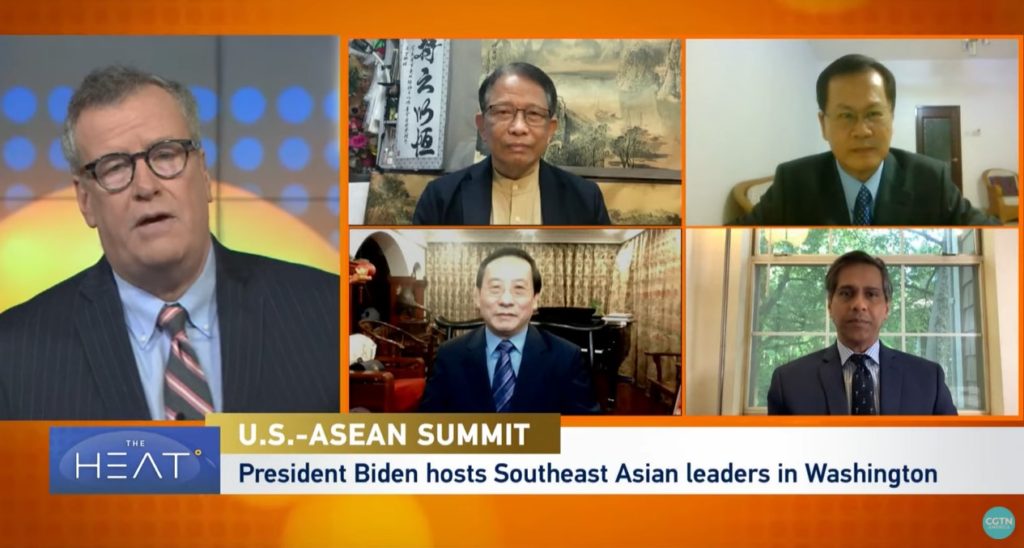

On Saturday, May 14, 2022, Senior Fellow Sourabh Gupta discussed the U.S.-ASEAN Summit on CGTN America’s The Heat.
On Friday, May 13, 2022, Research Associate Matt Geraci spoke to China-US Focus regarding ‘what’s on the table’ for U.S.-China cooperation moving forward.
On Thursday, May 12, 2022, Senior Fellow Sourabh Gupta spoke on TRTWorld and CGTN America about the U.S.-ASEAN Summit.

The Institute for China-America Studies is an independent nonprofit, nonpartisan research organization dedicated to strengthening the understanding of U.S.-China relations through expert analysis and practical policy solutions.
1919 M St. NW Suite 310,
Washington, DC 20036
icas@chinaus-icas.org
(202) 968-0595
© 2025 INSTITUTE FOR CHINA-AMERICA STUDIES. ALL RIGHTS RESERVED.